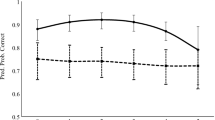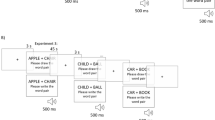Abstract
Background and aims
There is a substantial body of literature showing memory enhancement for self-generated information in normal aging. The present paper investigated this outcome for destination memory or memory for outputted information.
Methods
In Experiment 1, younger adults and older adults had to place (self-generated actions) and observe an experimenter placing (experiment-generated actions) items into two different destinations (i.e., a black circular box and a white square box). On a subsequent recognition task, the participants had to decide into which box each item had originally been placed. These procedures showed better destination memory for self- than experimenter-generated actions. In Experiment 2, destination and source memory were assessed for self-generated actions. Younger adults and older adults had to place items into the two boxes (self-generated actions), take items out of the boxes (self-generated actions), and observe an experimenter taking items out of the boxes (experiment-generated actions). On a subsequent recognition task, they had to decide into which box (destination memory)/from which box (source memory) each item had originally been placed/taken.
Results
For both populations, source memory was better than destination memory for self-generated actions, and both were better than source memory for experimenter-generated actions.
Discussions and conclusions
Taken together, these findings highlight the beneficial effect of self-generation on destination memory in older adults.


Similar content being viewed by others
Reference
El Haj M, Moroni C, Luyat M et al (2014) To what extent does destination recall induce episodic reliving? Evidence from Alzheimer’s disease. J Clin Exp Neuropsychol 36:127–136
El Haj M, Allain P (2014) Role of context recall in destination memory decline in normal aging. Geriatr Psychol Neuropsychiatr Vieil 12:432–439
Spencer WD, Raz N (1995) Differential effects of aging on memory for content and context: a meta-analysis. Psychol Aging 10:527–539
Rajah MN, Kromas M, Han JE (2010) Group differences in anterior hippocampal volume and in the retrieval of spatial and temporal context memory in healthy young versus older adults. Neuropsychologia 48:4020–4030
Gopie N, Craik FI, Hasher L (2010) Destination memory impairment in older people. Psychol Aging 25:922–928
El Haj M, Fasotti L, Allain P (2015) Destination memory for emotional information in older adults. Exp Aging Res 41:204–219
El Haj M, Omigie D, Samson S (2015) Destination memory and familiarity: better memory for conversations with Elvis Presley than with unknown people. Aging Clin Exp Res 27:337–344. doi:10.1007/s40520-014-0286-z
El Haj M, Raffard S, Gely-Nargeot MC (2015) Destination memory and cognitive theory of mind in normal ageing. Memory 13:1–9. doi:10.1080/09658211.2015.1021257
El Haj M, Postal V, Allain P (2013) Destination memory in Alzheimer’s disease: when I imagine telling Ronald Reagan about Paris. Cortex; A J Devoted Study Nerv Syst Behav 49:82–89
El Haj M, Postal V, Le Gall D (2013) Destination memory in mild Alzheimer’s Disease. Behav Neurol 26:215–216
Mulligan NW, Lozito JP, Rosner ZA (2006) Generation and context memory. J Exp Psychol Learn Mem Cogn 32:836–846
Slamecka NJ, Graf P (1978) The generation effect: delineation of a phenomenon. J Exp Psychol Hum Learn 4:592
Brown AS, Jones EM, Davis TL (1995) Age differences in conversational source monitoring. Psychol Aging 10:111–122
El Haj M, Fasotti L, Allain P (2012) Source monitoring in Alzheimer’s disease. Brain Cogn 80:185–191
Folstein MF, Folstein SE, McHugh PR (1975) Mini-mental state. A practical method for grading the cognitive state of patients for the clinician. J Psychiatr Res 12:189–198
Deltour J (1993) Echelle de vocabulaire de Mill Hill de JC Raven. Vocabulay scale of JC Raven. Adaptation française et normes européennes du Mill Hill et du Standard Progressive Matrices de Raven (PM38) Braine-le-Château: Editions l’application des techniques modernes
Content A, Mousty P, Radeau M (1990) BRULEX. Une base de données lexicales informatisée pour le français écrit et parlé. = BRULEX: A computerized lexical data base for the French language. L’Année Psychologique 90:551–66
Gopie N, Macleod CM (2009) Destination memory: stop me if I’ve told you this before. Psychol Sci 20:1492–1499
Marsh EJ, Edelman G, Bower GH (2001) Demonstrations of a generation effect in context memory. Mem Cogn 29:798–805
Symons CS, Johnson BT (1997) The self-reference effect in memory: a meta-analysis. Psychol Bull 121:371–394
Gutchess AH, Kensinger EA, Schacter DL (2010) Functional neuroimaging of self-referential encoding with age. Neuropsychologia 48:211–219
Gutchess AH, Kensinger EA, Yoon C (2007) Ageing and the self-reference effect in memory. Memory 15:822–837
Hamami A, Serbun SJ, Gutchess AH (2011) Self-referencing enhances memory specificity with age. Psychol Aging 26:636–646
Acknowledgments
The author would like to thank Dr. Ray Cooke for linguistic assistance.
Author information
Authors and Affiliations
Corresponding author
Ethics declarations
Conflict of interest
The author states that there is no conflict of interest.
Ethical approval
All procedures performed in studies involving human participants were in accordance with the ethical standards of the institutional and/or national research committee and with the 1964 Helsinki declaration and its later amendments or comparable ethical standards.
Statement of human and animal rights
Research ethics were applied in accord with the Helsinki Declaration of 1975.
Informed consent
Informed consent was obtained from all individual participants included in the study.
Rights and permissions
About this article
Cite this article
El Haj, M. Destination memory for self-generated actions. Aging Clin Exp Res 28, 935–941 (2016). https://doi.org/10.1007/s40520-015-0505-2
Received:
Accepted:
Published:
Issue Date:
DOI: https://doi.org/10.1007/s40520-015-0505-2




